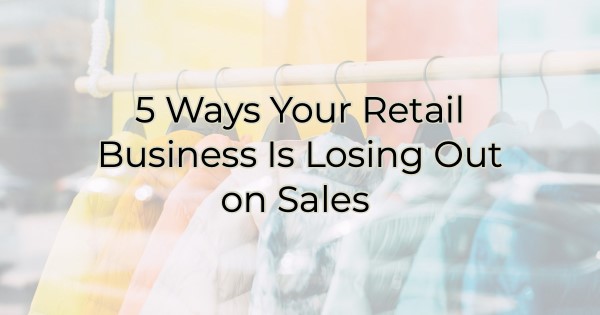5 Ways Your Retail Business Is Losing Out on Sales

Do you love small towns with gorgeous Main Streets that are fun weekend adventures in dining and shopping? You know the places with one unique business after another with friendly employees who show you their amazing wares and make you feel welcome.
But…
Local businesses sometimes have their hang ups.
Sometimes there are people begging small businesses to take their money and yet, those businesses can be difficult to buy from.
Does that sound like your business? Then maybe you are struggling with some of the following problems.
If you own a small business, you may be lamenting the fact you’re not doing enough business. You increase your marketing and yet, you still can’t seem to bring in the numbers you want. Why is that? Surprise! It may not be your marketing.
1. You’re closed when you should be open. Employee hiring crisis notwithstanding, some small businesses have short or inconsistent hours. While it seems like hanging a sign on your door that reads “Be right back” may help those who stop by when you’re not open, rest assured they won’t be back or wait for you. Not having solid hours that your community can count on you to be open drives more people online.
2. You’re closed during holidays. This is not a call to stay open on Thanksgiving and Christmas. But if there’s a long holiday weekend that might bring tourists (or other shoppers) into your area, it benefits you to stay open. It also is a good idea to add additional evening hours during things like Wine Walks, parades, or First Fridays. Find out when there are events in your area and offer special hours to accommodate shoppers. Also, keep in mind if you’re located near businesses that stay open late like restaurants, that you might want to adjust your hours accordingly. When those restaurants are busy, people who are waiting to be seated may just come into your business to see what you have to offer.
3. You aren’t interested in relationship building. One of the differentiators for local businesses is their connection factor. Locals often give you advice and suggestions about the area such as retail people recommending best places to dine and employees at restaurants suggesting “must-see” places in town. A solid way to get more business is to build relationships with other nearby businesses. If you’re not doing that, you’re missing out. Also, if you are cutting conversations short when someone asks you about the area, you’re cutting off the potential for a sale. People buy from people they know, like, and trust. If you’re short with your answers, they may go somewhere else.
4. You assume everyone is browsing. It’s difficult when you have the kind of business where people stroll in and out. After a while it’s easy to assume everyone is just a tire kicker and not a buyer. But when you do that, you may accidentally miss a buyer. Your assumption may color your interest in (and patience with) the person and you may be inadvertently driving them to another business instead of your own.
5. You are only brick and mortar. Many shop owners see themselves as being in competition with Amazon and other online retailers and thus develop a “them against me” attitude toward online offerings. That’s a loosing attitude. I visited a hat shop recently with beautiful, unique styles and amazing prices. But I had flown into town with just a carry on and was traveling with my husband, who loves hats. Immediately, I thought about Christmas, but I couldn’t buy anything with him there. As I exited the store, I asked if she had a business card. No, she was out. Did she have an online store, or did she sell on Etsy or the Marketplace? She looked offended that I would suggest such a thing. She didn’t make a sale that day, but she could’ve. She could’ve even become my go-to store for future hat purchases. You don’t have to like e-commerce stores, but you do have to sell that way if you want to reach your potential for customers and sales.
If you want people to buy from you, you need to be friendly and open. Think of every person who enters as a possible touchpoint for a sale. Even if they don’t buy from you, there’s a chance they will refer someone or speak of your operation, and you may get that sale down the line. If you want to increase sales, don’t make these mistakes.
Christina R. Metcalf (formerly Green) is a marketer who enjoys using the power of story and refuses to believe meaningful copy can be written by bots. She helps chamber and small business professionals find the right words when they don’t have the time or interest to do so. Christina hates exclamation points and loves road trips. Say hi on Twitter or reach out on Facebook.

